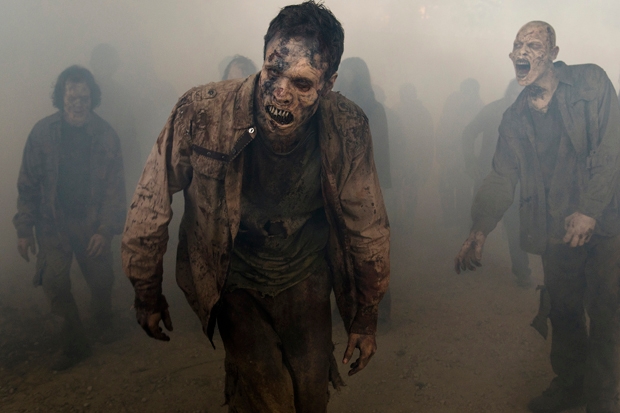When I was a child in the 1970s, the two big excitements of the run-up to Christmas were first the chocolate Advent calendar which, somehow, I managed to smuggle past the prison-guard inspection at my Colditz-like prep school; and second, browsing the Radio Times to see what televisual delights the Christmas hols had in store.
Now I hardly bother with chocolate —unless it’s Artisan du Chocolat, in which case, yes please. And I find Christmas TV, all Christmas TV, even if it’s a Nick Park animation that has never been on before, so intrinsically depressing that I just want to string myself up from one of the giant black hooks hanging from our kitchen ceiling. They have been used for this very purpose once before, by one of the previous tenants. But obviously, I’d make sure to keep in with the festive spirit by using a long sturdy twine of mistletoe or tinsel rather than ugly, quotidian rope.
The other day, I was delighted to meet a fellow Christmas sceptic, the Revd Richard Coles — the former Communard who presides over that agreeable Radio 4 show Saturday Live. Richard — with whom I bonded enormously over liver and bacon at a Northants pub — tells me that if he had his way, he would retire early on Christmas morning with a boxed set of The Walking Dead and a bottle of whisky and spend the rest of the day in bed.
Both of us suffer the tragedy of having to live with partners who won’t do zombies. I think this is cruel and unfair of my wife, for whom I make many sacrifices. Just now, for example, I joined her in the garden to rake some leaves — even though I’m sure they’d have been much happier where they were, rotting on the lawn — because I know these little touches make her happy. You’d think that in return the very least she would do is sit beside me pretending to enjoy the dwindling band of survivors bashing in zombies’ brains much as I pretend to enjoy it when I sit with her through an episode of Gardeners’ World.
After vampires — proper, Salem’s Lot-type vampires, not your pale, vegetarian Twilight imitations — zombies are probably my favourite horror creature. The reason they make such good TV, and why The Walking Dead has lasted so many seasons, is that they are simultaneously the worst thing imaginable (the rotting flesh, the terrible potential outcome) and reassuringly, almost charmingly harmless.
They’re a manifestation of what Brian Aldiss called the ‘cosy catastrophe’. He was using it — disparagingly, I think — to refer to the works of John Wyndham. But surely this is why Wyndham — in Triffids especially — remains so enduringly popular and endlessly remade. We all love to fantasise, now and again, about how we’d get on in a dystopian future where almost everyone has died but where there’s still lots of cool, fun kit — guns, cars, tanks if you know how to drive one — left behind to defend the remnants of civilisation.
In the early days of The Walking Dead I took agin the series because I got it into my head that there was too much talking and emotional slush and not enough savage killing. But when I got back into it again, while convalescing from my accident earlier this year, I began to appreciate the longueurs and the gradual build-up of the various human relationships. Where’s the jeopardy and tension, after all, if you’re not personally invested in the futures of the characters as, tragically, they get picked off one by one?
I used to be bothered, too, by the fact that the zombies move so pathetically slowly. (Unlike, say, the ones in World War Z, which can overwhelm your position in a trice.) But if they didn’t, this would remove one of the most enjoyable elements in The Walking Dead: the apparently safe and impregnable sanctuary where, at long last, the survivors can endeavour to rebuild the vestiges of their old life.
In season two you’ve got the bucolic idyll of Hershel’s farm; then in season three there’s that fortress of a prison; then there’s the pretend-lovely town of Woodbury (run by David Morrissey’s the Governor; almost certainly modelled on Bicester Village, only with zombies filling in for the Chinese tourists); then there’s that lovely campsite with the tank and the zombie pits; then — which is as far as I’ve got — the haven at the end of the railtrack called Terminus.
On each occasion, just when everyone has settled in nicely, the whole thing goes tits up. Normally, it’s not the fault of the zombies (who are only as much of a threat as you are prepared to make them through your own carelessness) but of the humans, at least some of whom, freed from the constraints of civilised society, cannot help messing things up with their aggression and venality and hunger for power.
Really, like the Revd Richard Coles, I can’t think of anything I’d rather watch this Christmas than all seven (and a bit) seasons of The Walking Dead, back to back. The problem with Christmas is that it can lull you into a misleading sense of bonhomie and complacency.
Wall-to-wall death and zombies, on the other hand, is the perfect preparation
for 2017.







Comments